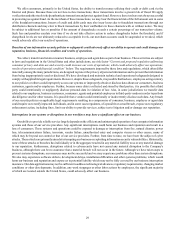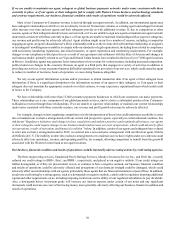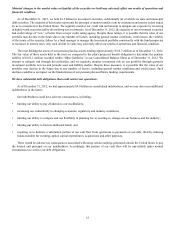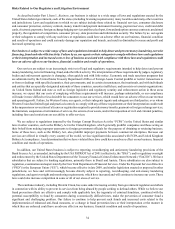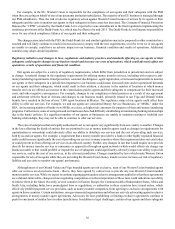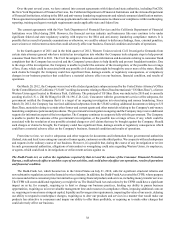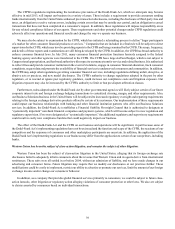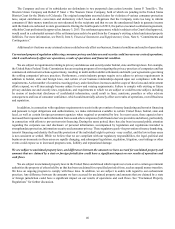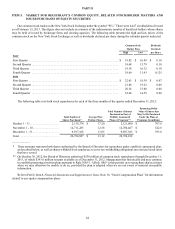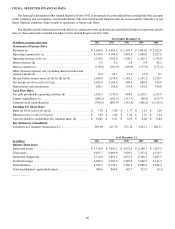Western Union 2012 Annual Report Download - page 41
Download and view the complete annual report
Please find page 41 of the 2012 Western Union annual report below. You can navigate through the pages in the report by either clicking on the pages listed below, or by using the keyword search tool below to find specific information within the annual report.36
For example, in the EU, Western Union is responsible for the compliance of our agents and their subagents with the PSD
when they are acting on behalf of one of our payments institution subsidiaries. The majority of our EU business is managed through
our PSD subsidiaries. Thus, the risk of adverse regulatory action against Western Union because of actions by its agents or their
subagents and the costs to monitor our agents or their subagents in those areas has increased. The Consumer Financial Protection
Bureau (the “CFPB”) created by the Dodd-Frank Act is expected to issue amendments to the final regulations implementing the
remittance provisions of the Dodd-Frank Act, which may be effective by mid-2013. The Dodd-Frank Act will impose responsibility
on us for any related compliance failures of our agents and their subagents.
The changes associated with the PSD, the Dodd-Frank Act and similar legislation enacted or proposed in other countries have
resulted and will likely continue to result in increased costs to comply with the new requirements, or in the event we or our agents
are unable to comply, could have an adverse impact on our business, financial condition and results of operations. Additional
countries may adopt similar legislation.
Regulatory initiatives and changes in laws, regulations and industry practices and standards affecting us, our agents or their
subagents could require changes in our business model and increase our costs of operations, which could adversely affect our
operations, results of operations and financial condition.
Our agents are subject to a variety of regulatory requirements, which differ from jurisdiction to jurisdiction and are subject
to change. A material change in the regulatory requirements for offering money transfer services, including with respect to anti-
money laundering requirements, fraud prevention, customer due diligence, agent registration, or increased requirements to monitor
our agents or their subagents in a jurisdiction important to our business could mean increased costs and/or operational demands
on our agents and their subagents, which could result in their attrition, a decrease in the number of locations at which money
transfer services are offered, an increase in the commissions paid to agents and their subagents to compensate for their increased
costs, and other negative consequences. For example, changes to our compliance-related practices as a result of our agreement
and settlement with the State of Arizona and changes to our business model, primarily related to our Vigo and Orlandi Valuta
brands, have resulted in the loss of over 7,000 agent locations in Mexico. The regulatory status of our agents could affect their
ability to offer our services. For example, we and our agents are considered Money Service Businesses, or “MSBs,” under the
BSA. An increasing number of banks view MSBs, as a class, as higher risk customers for purposes of their anti-money laundering
programs. Furthermore, some of our agents and our businesses have had difficulty establishing or maintaining banking relationships
due to the banks' policies. If a significant number of our agents or businesses are unable to maintain existing or establish new
banking relationships, they may not be able to continue to offer our services.
The types of enterprises that are legally authorized to act as our agents vary significantly from one country to another. Changes
in the laws affecting the kinds of entities that are permitted to act as money transfer agents (such as changes in requirements for
capitalization or ownership) could adversely affect our ability to distribute our services and the cost of providing such services,
both by us and our agents. For example, a requirement that a money transfer provider be a bank or other highly regulated financial
entity could increase significantly the cost of providing our services in many countries where that requirement does not exist today
or could prevent us from offering our services in an affected country. Further, any changes in law that would require us to provide
directly the money transfer services to consumers as opposed to through an agent network (which would effectively change our
business model) or that would prohibit or impede the use of subagents could significantly adversely impact our ability to provide
our services, and/or the cost of our services, in the relevant jurisdiction. Changes mandated by laws which make Western Union
responsible for acts of its agents while they are providing the Western Union money transfer service increase our risk of regulatory
liability and our costs to monitor our agents' performance.
Although most of our Orlandi Valuta and Vigo branded agents are not exclusive, most of our Western Union branded agents
offer our services on an exclusive basis - that is, they have agreed by contract not to provide any non-Western Union branded
money transfer services. While we expect to continue signing agents under exclusive arrangements and believe that these agreements
are valid and enforceable, changes in laws regulating competition or in the interpretation of those laws could undermine our ability
to enforce them in the future. Recently, several countries in Eastern Europe, the Commonwealth of Independent States, Africa and
South Asia, including India, have promulgated laws or regulations, or authorities in these countries have issued orders, which
effectively prohibit payment service providers, such as money transfer companies, from agreeing to exclusive arrangements with
agents in those countries. Certain institutions, non-governmental organizations and others are actively advocating against exclusive
arrangements in money transfer agent agreements. Advocates for laws prohibiting or limiting exclusive agreements continue to
push for enactment of similar laws in other jurisdictions. In addition to legal challenges, certain of our agents and their subagents





